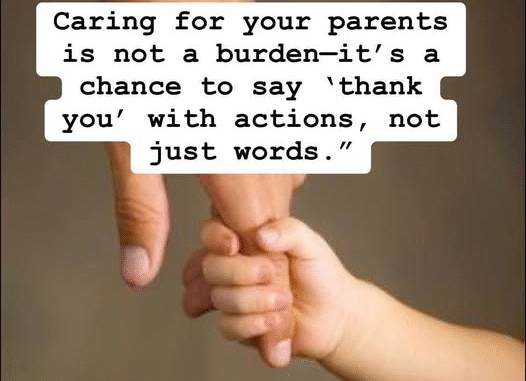
There comes a moment in life when the roles reverse. The hands that once held yours as you took your first steps now need your support to steady theirs. The voice that read you bedtime stories now struggles to recall the simplest details. The people who sacrificed everything to raise you—your parents—begin to need you in ways they never did before.
Society often frames caregiving as a burden—a duty to be endured, a responsibility that disrupts our busy lives. But what if we seen it differently? What if caring for our parents isn’t an obligation, but a privilege—a chance to say ‘thank you’ in the most meaningful way?
The Love That Raised You
Think about the countless nights your parents stayed up when you were sick. The meals they cooked, the clothes they mended, the lessons they taught—not just with words, but with actions. They worried when you were late. They celebrated your smallest wins like they were their own. They gave up their dreams, their time, even their sleep, to make sure you had everything you needed.
Now, life has come full circle. The strength they once had is fading. The independence they cherished is slipping. And suddenly, you’re faced with a choice: Do you see this as a burden, or do you recognize it as an opportunity?
Caring for your parents is not about repaying a debt—because what they gave you can never truly be repaid. It’s about honoring the love they poured into you. It’s about showing them, in small, everyday ways, that they mattered. That their sacrifices were seen. That their love was worth it.
Actions Speak Louder Than Words
We’ve all said “Thank you” to our parents. But words, no matter how heartfelt, can fade. Actions last.
- Helping them with daily tasks—whether it’s cooking a meal, managing medications, or just sitting with them while they watch their favorite show—is a way of saying, “I’m here now, just like you were for me.”
- Listening to their stories—even the ones you’ve heard a hundred times—validates their lives and memories. It tells them, “Your experiences matter. You still matter.”
- Being patient when they repeat themselves or move slower than they used to is a way of saying, “I see you. I respect you. I’m not in a rush when it comes to you.”
- Making decisions with their dignity in mind—whether it’s about their health, their home, or their happiness—shows them, “Your wishes are important to me.”
These acts of love are not chores. They are gifts—ones that deeply the bond between you and heal old wounds. They are proof that the lessons they taught you—about kindness, resilience, and love—were not lost on you.
The Lessons They Still Teach You
Caring for your parents is not just about them. It’s also about you.
- It teaches you humility—because no matter how successful or independent you are, you need them just as much as they need you now.
- It strengthens your empathy—because walking in their shoes, even for a moment, helps you understand the fragility of life and the importance of compassion.
- It prepares you for your own future—because one day, you or your children may be in the same position, and you’ll want someone to care for you with the same love you showed them.
There is beauty in these moments—even the hard ones. There is grace in holding their hand when they’re afraid. There is peace in knowing that, when they look at you, they see the child they loved and the adult they raised—all at once.
A Legacy of Love
Our parents won’t be here forever. That’s the painful truth we all face. But the way we care for them in their final chapters becomes part of their legacy—and ours.
When you choose to care for your parents with patience, respect, and love, you’re not just helping them. You’re showing the world—and future generations—what family truly means. You’re teaching your own children that love isn’t just something you feel—it’s something you do, even when it’s hard, even when it’s inconvenient.
You’re proving that some bonds are stronger than time, distance, or circumstance. That some love is unconditional.
The Greatest ‘Thank You’
So the next time you feel overwhelmed by the responsibility of caring for your parents, pause. Remind yourself that this is not a burden. It’s a chance—maybe your last chance—to give back a fraction of what they gave you.
It’s a chance to hold their hand the way they held yours. To wipe their tears the way they wiped yours. To love them in their weakness the way they loved you in yours.
Because in the end, caring for your parents isn’t about what you lose. It’s about what you gain: the deepest satisfaction of knowing you loved them well. That you made their twilight years a little brighter, a little softer, a little fuller of love.
And that, more than anything, is the greatest ‘thank you’ you could ever give.